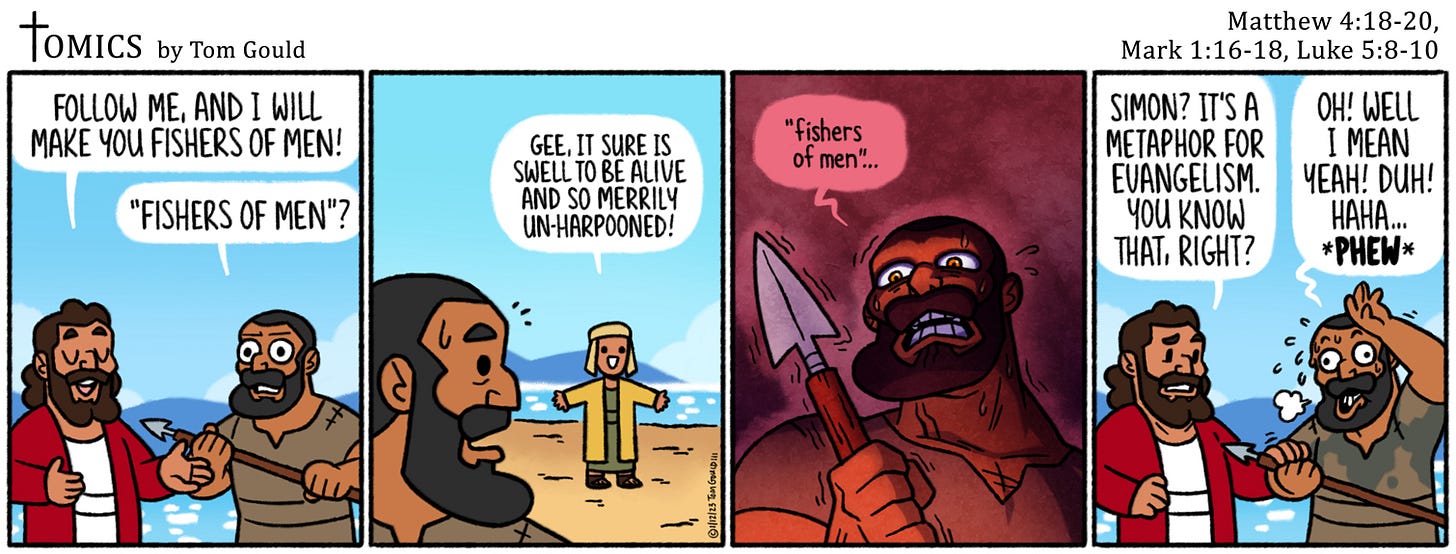***
Reading 1
Is 8:23—9:3
First the Lord degraded the land of Zebulun and the land of Naphtali; but in the end he has glorified the seaward road, the land west of the Jordan, the District of the Gentiles.
Anguish has taken wing, dispelled is darkness: for there is no gloom where but now there was distress. The people who walked in darkness have seen a great light; upon those who dwelt in the land of gloom a light has shone. You have brought them abundant joy and great rejoicing,
as they rejoice before you as at the harvest, as people make merry when dividing spoils. For the yoke that burdened them, the pole on their shoulder, and the rod of their taskmaster you have smashed, as on the day of Midian.
The Assyrians invaded Israel in the 730s B.C. Isaiah prophesies that they will eventually be made free, and the borders of Israel will return to what they were in King David’s time.
But of course, we interpret this prophesy in a broader way, predicting David’s heir, Jesus. Galilee was home to many gentiles in Isaiah’s time,1 which is why it’s fitting that Jesus should come from there. Most of the Hebrew Scriptures are focused on the Hebrews,2 but Jesus expands all of that to the whole world.
Responsorial Psalm
Ps 27:1, 4, 13-14
R. The Lord is my light and my salvation.
The LORD is my light and my salvation;
whom should I fear?
The LORD is my life’s refuge;
of whom should I be afraid?
R. The Lord is my light and my salvation.
One thing I ask of the LORD;
this I seek:
To dwell in the house of the LORD
all the days of my life,
That I may gaze on the loveliness of the LORD
and contemplate his temple.
R. The Lord is my light and my salvation.
I believe that I shall see the bounty of the LORD
in the land of the living.
Wait for the LORD with courage;
be stouthearted, and wait for the LORD.
R. The Lord is my light and my salvation.
Sometimes an act of faith involves talking yourself into it, as the Psalmist does here. He starts with a bold and clear statement, the the Lord is my light and my salvation. But then he asks God to dwell in the house of the Lord, which seems to already be contained in the first statement?
Then he returns to stating that he believes he’ll see the bounty of the Lord. Why ask for something that he already believes he’ll get?
Probably because we all need reminders, from time to time, that God is there for us. That’s why he wraps it up with “wait for the Lord.” He’s talking to you and to me, but he’s also talking to himself. I think it’s okay, or at least natural, but be uncertain about your certainty. A good pep talk from Psalm 27 could help.
Reading 2
1 Cor 1:10-13, 17
I urge you, brothers and sisters, in the name of our Lord Jesus Christ, that all of you agree in what you say, and that there be no divisions among you, but that you be united in the same mind and in the same purpose. For it has been reported to me about you, my brothers and sisters, by Chloe’s people, that there are rivalries among you. I mean that each of you is saying, “I belong to Paul,” or “I belong to Apollos,” or “I belong to Cephas,” or “I belong to Christ.” Is Christ divided? Was Paul crucified for you? Or were you baptized in the name of Paul? For Christ did not send me to baptize but to preach the gospel, and not with the wisdom of human eloquence, so that the cross of Christ might not be emptied of its meaning.
Paul doesn’t want you to confuse the apostles for Christ Himself. Obviously, you don’t belong to Paul or Apollos or Cephas (Peter).3 You also don't belong to your bishop or priest. There’s only one Gospel, one Jesus, one communion and it’s the same throughout the world in the universal Church.
That’s why you’re not supposed to pick and choose which parish you attend. Whether or not a particular priest appeals to your taste should be irrelevant, because you’re there for the Gospel and the Eucharist. And consider this: maybe there’s a reason God put you in a parish where you don’t especially like the priest?
And if you do have a preference for one priest or another, as apparently the Corinthians did, don’t let that fool you into thinking there’s a division in the Church. They were ordained through the same apostolic succession from Peter and the Apostles through to today’s pope and bishops.
Alleluia
Mt 4:23
R. Alleluia, alleluia.
Jesus proclaimed the Gospel of the kingdom
and cured every disease among the people.
R. Alleluia, alleluia.
I never know what to say about the Gospel Acclamation if it’s just a line from the Gospel. Without context, this is just, you know, a cliff’s notes of what Jesus did.
Gospel
Mt 4:12-23
When Jesus heard that John had been arrested, he withdrew to Galilee. He left Nazareth and went to live in Capernaum by the sea, in the region of Zebulun and Naphtali, that what had been said through Isaiah the prophet might be fulfilled: Land of Zebulun and land of Naphtali, the way to the sea, beyond the Jordan, Galilee of the Gentiles, the people who sit in darkness have seen a great light, on those dwelling in a land overshadowed by death light has arisen. From that time on, Jesus began to preach and say, “Repent, for the kingdom of heaven is at hand.”
As he was walking by the Sea of Galilee, he saw two brothers, Simon who is called Peter, and his brother Andrew, casting a net into the sea; they were fishermen. He said to them, “Come after me, and I will make you fishers of men.” At once they left their nets and followed him. He walked along from there and saw two other brothers, James, the son of Zebedee, and his brother John. They were in a boat, with their father Zebedee, mending their nets. He called them, and immediately they left their boat and their father and followed him. He went around all of Galilee, teaching in their synagogues, proclaiming the gospel of the kingdom, and curing every disease and illness among the people.
Jesus heard His cousin was arrested, so He took some time to get away (and fulfill the prophesy mentioned in today’s first reading). But He doesn’t stop His holy work. He keeps going, because the people still need him.
He finds more helpers, knowing full well that His time on Earth will be limited, but the Kingdom will still need to be proclaimed for the rest of time.
Notice that Matthew writes “their synagogues,” despite writing to Jews and still identifying as a Jew himself. This probably means he was writing his Gospel after the Church started to consider itself something separate from Judaism. It was a long process of broadening the reach of Jesus’ message to include all of humanity, but as this passage reminds us, there’s still more to do.
Your church may have omitted the second part of this reading, because we heard this exact passage back in November. But I wanted an excuse to share the “remastered” Tomics comic on this passage—
Matthew translates “District of the Gentiles” as “Galilee of the Gentiles,” which fits the geographic description.
Duh.
Weirdly, this contradicts what I said the other day about Peter always being listed first. I suspect it’s because here, the list isn’t meant to honor the apostles but to put them in their proper place, below Jesus.





